Pertinax (2)
Publius Helvius Pertinax (126-193): Roman general and emperor. His reign marks the beginning of the "year of the five emperors".
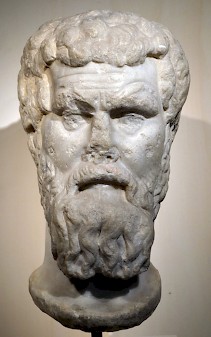
Pertinax had retired to his country estate in Liguria.note Although he had started as a mere son of a freedman, he had had a distinguished military career during the Parthian War of Lucius Verus and the northern wars of Marcus Aurelius. In 175, Pertinax had been consul, and after new military commands in the northern war, he had been governor of Syria and supreme commander of the Roman forces in the east. When he was fifty-six, however, the praetorian prefect Sextus Tigidius Perennis, acting on behalf of the emperor Commodus, had forced Pertinax to retire.
In 184, there was a tribal revolt in Britannia, which was suppressed by its governor, Ulpius Marcellus, but provoked anger among the three legions (II Augusta, VI Victrix, and XX Valeria Victrix). Then, something incredible happened: the legionaries sent 1500 javelin men to the continent, who proceeded to Rome without meeting serious resistance. Here, they met the emperor, who believed them when they accused Perennis of treason, and Commodus put his praetorian prefect to death.
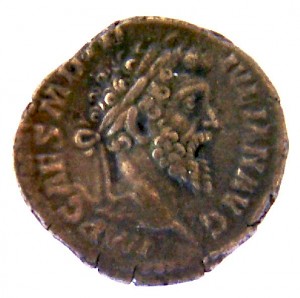
Now, Commodus needed not only a new prefect, but also a reliable man to restore order in the northwest. He reconciled himself with Pertinax and immediately made him governor of Britain (185-187),note
But Pertinax was not to be pensioned off. In Carthage, there were riots because of some prophecy, and at the age of sixty-two, Pertinax was made governor (with the impressive rank of proconsul) of Africa, one of the most prestigious positions in the Roman government.{{Historia Augusta, "Pertinax" 4.1.] He put an end to the disturbances and was succeeded by Didius Julianus.
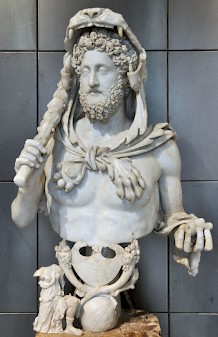
Pertinax returned to Italy in 189, where he was immediately appointed as mayor of Rome (praefectus urbi).note Here, he witnessed the problems of the last years of the reign of Commodus, and was in a position to influence them. He was very close to the ruler: on 1 January 192, he and Commodus entered the consulship.note A senator serving a second term as a consul was rare, being consul together with the emperor meant that one was one of his favorites.
However, for some time already, the emperor Commodus had been becoming more autocratic in his manners. He had been seen exercising with gladiators and wanted to be addressed as "the Roman Hercules". Eccentric behavior was not unknown to the Romans, but it had not been witnessed for almost a century. Even worse was to come. In December 192, the emperor presented himself as a gladiator, fighting in the arena of the Colosseum. The senators started to feel threatened by their master. They thought that he had lost his mind and feared that one day, he would attack them.
This fear was fully justified. Commodus had always neglected the senatorial aristocracy and had, especially during his last years, preferred self-made men like Pertinax, Pescennius Niger (governor of Syria), Asellius Aemilianus, the two brothers Geta and Lucius Septimius Severus, and the praetorian prefect Quintus Aemilius Laetus.
On 31 December, a group of conspirators, killed the emperor. What actually happened will probably never be known (conspiracies have the nasty habit of being secret affairs), but there is every reason to believe that the assassination was not an improvised action (as our sources state), but had been planned for some time. The date of the murder was carefully chosen: on New Year's day, soldiers did not carry weapons, and after a night of heavy drinking, they were disorganized. This was necessary for the murder to be successful, because the soldiers of the imperial guard were truly devoted to their emperor. Another sign that the murder was planned is the fact that there was a plan-B: when poison had turned out to be insufficient, an athlete named Narcissus finished the job.
It is interesting to see that there were many important people on key positions when Commodus was murdered. Pertinax was mayor; his personal friends Lucius Septimius Severus and Publius Septimius Geta commanded the nearby armies of the Danube as governors of Pannonia Superior and Moesia Inferior. Other important men were Clodius Albinus (governor of Britannia), Gaius Fulvius Plautinianus (praefectus vigilum), and finally Lucius Mantennius Sabinus, who, as governor of Egypt, controlled the food supply of Rome. Perhaps Pertinax's father-in-law Titus Flavius Sulpicianus must be mentioned too, an influential senator who had recently governed wealthy Asia. Although absolute certainty is not possible, it looks as if the conspiracy was well-organized.
Immediately, a rumor circulated that Commodus had had the intention to kill the consuls (according to Cassius Dionote or his relatives (according to Herodian). Perhaps this was true, but it sounds as if the conspirators tried to cover up what they had planned all along.
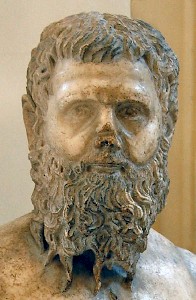
The official account of the murder was that Commodus threatened his relatives and/or courtiers, that they defended themselves, and that did not start to look for a worthy successor before the early hours of 1 January 193. Pertinax, it is said, did not know anything beforehand; praetorian prefect Laetus offered him the empire while he was still in his sleeping room. This is very implausible. The old general had been mayor of the city for almost three years: he knew everyone who really mattered and had excellent connections at court. Besides, it would be strange if the conspirators had thought of everything, except a worthy successor.
However this may be, it is certain that Pertinax first went to the barracks of the praetorian guard, where Laetus announced the death of Commodus and proclaimed Pertinax emperor. He offered the soldiers a reward (donativum) of 12,000 sesterces and having obtained their support, he went to the Curia Julia, where the senators acclaimed him too. It was still night. Next, Pertinax proceeded to the Capitol, where he sacrificed to the supreme god Jupiter, an imperial prerogative on New Year's day. Finally, he took possession of the palace. He was now master of the state.
Pertinax' reign started with celebration and happiness, and he was smart enough to appoint reliable men on key positions. His father-in-law Titus Flavius Sulpicianus was the new mayor. He was a nobleman and would make Pertinax, a social climber, acceptable to more old-fashioned senators. Of course, Quintus Aemilius Laetus was reappointed as praetorian prefect.
Unfortunately, the empire was not to enjoy a smooth regime change. The soldiers of the imperial guard were missing Commodus and disliked the old general, who had promised them a large sum of money, but could pay them only half of it. So, they remained unquiet, although Pertinax ordered Commodus' possessions to be auctioned to raise money.
Pertinax did his best to rule as an emperor should. Because many people had died because of a plague, there was agricultural land that was no longer used. As long as the owner remained unidentified, no one could use it, but Pertinax made it lawful to occupy it. He also abolished several taxes and ordered that property-ratings should be reassessed. In the city, which had suffered from a great fire, he ordered repairs.
Unlike Commodus, Pertinax wanted to rule in accordance with the wishes of the Senate - Herodian even calls him a democrat. This was, to a certain extent, nothing but a cultivated image. His real power was that of the legions, commanded by Clodius Albinus in the northwest, the Severi brothers in the north, and Pescennius Niger in the east. But Pertinax's image as a normal senator, not living in great luxury, won him the hearts of anyone who had feared Commodus. And certain measures, like the expulsion of informers from the city, were real enough. Pertinax also attended the meetings of the Senate regularly. It was as if the old times of Marcus Aurelius had returned, and Pertinax did not hesitate to proclaim something like a "new era" by minting coins showing the two-headed Janus, the god of all new beginnings.
Still, there was not enough money to pay the soldiers. There were rumors about conspiracies, but no one was able to point out who was involved. Some said former consul Falco, others mentioned the praetorian prefect Quintus Aemilius Laetus. Probably, there was no conspiracy at all, especially since Pertinax had not yet chosen his successor. His son Publius was still too young, and there was a lot of gossip about the appointment of someone who might act as regent if Pertinax would die too soon. As long as no one knew who this possible regent might be - Laetus? Sulpicianus? - no conspirator knew how and where to strike.
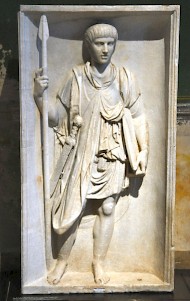
But the atmosphere was tense, and eighty-six days after the death of Commodus, on 28 March 193, a sedition broke out in the barracks. They had received only half of the 12,000 sesterces they had been promised. A group of soldiers burst into the palace, where one of them killed his master. Pertinax was sixty-six years old.
Nobody had planned this murder. The soldiers were not fighting for a particular pretender, they were just angry. They never had a design to kill their emperor, but it just happened. The terrible deed was immediately regretted and the throne was offered to Pertinax' nearest surviving male relative, his father-in-law Sulpicianus, who was probably to act as regent until Pertinax's son Publius had grown up.
Sulpicianus hurried to the barracks of the guard, and promised each of the soldiers 20,000 sesterces - eight yearly wages. (Marcus Aurelius had offered the same amount of money in 161.) At that moment, Didius Julianus arrived, a senator who, like Pertinax, had been a successful general and had once been Pertinax' colleague as consul. It was said that only a few days before, the emperor had said to some of his courtiers that he wanted Didius Julianus to be regarded with due respect, because he had been his colleague and would be his successor.
Now Didius Julianus declared that he had been appointed as regent, and shouted from the foot of the rampart that he offered the soldiers 25,000 sesterces. Immediately, he was let into the camp and recognized as emperor. It was still 28 March; Pertinax had been dead for only a couple of hours.
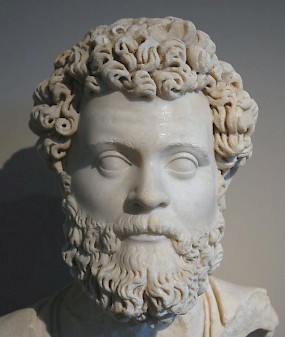
When the news that the empire had been auctioned away became known in the provinces, the former allies of Pertinax acted at once: Pescennius Niger in Syria, Clodius Albinus in Britannia, and Septimius Severus in Pannonia Superior were all proclaimed emperor. In the end, Severus won the civil war of the year 193, and founded a dynasty that was to rule until 235.
Pertinax was buried in the family tomb of his family-in-law, and was enrolled among the gods. Sacrifices were offered daily in the temple of Marcus Aurelius and Faustina; Pertinax' son Publius was his first priest.
Thus ended the most spectacular of all known Roman careers. Yet, although it was spectacular, it was also typical of his age. North of the Roman empire, new tribal confederations had been forged, which were far more serious than earlier Germanic tribes. The future belonged to military men like Pertinax, Didius Julianus, and Septimius Severus. As a general, Pertinax had often given the same watch-word, one that summarizes both his own honorable career and the future of Rome: militemus, "Let us be soldiers".
Literature
- The English text of the biography of Pertinax from the Historia Augusta can be found at LacusCurtius - here; the Latin text is available here.
- LacusCurtius also offers the text of Cassius Dio, and book 74 can be found here.
- Herodian describes the events in Book 2 of the History of the Roman Empire.